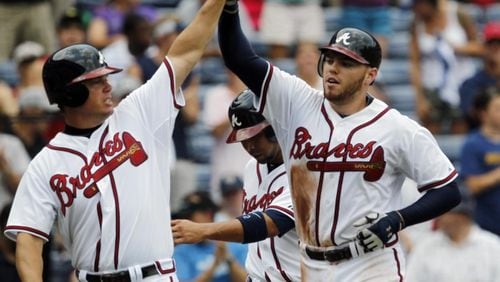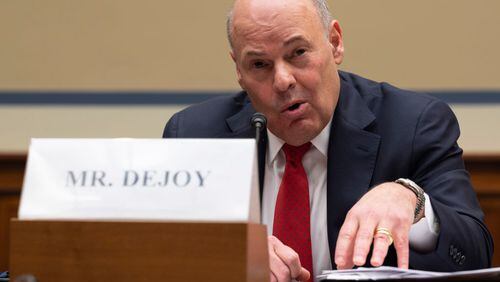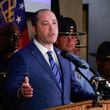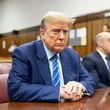After Freddie Freeman hit his third homer in four games Friday and had two hits to raise his average to .400 in seven games since returning from a seven-week stint on the disabled list, the performance drew another postgame reference to Braves royalty, retired third baseman Chipper Jones.
And guess who happened to be sitting just behind the on-deck circle Friday when Freeman put the Braves ahead with a sixth-inning homer, then came through again with an eighth-inning single that scored the tying and go-ahead runs in the Braves’ 4-3 win over the Diamondbacks? His pal Chipper.
“I beam whenever I talk about Freddie,” said Jones, a former teammate and proud mentor to the current Braves slugger. “To kind of take him under the wing early on in his career, now to be retired and see him continue to get better every single year and blossom. Freddie’s got that knack. Last night, for instance, I was sitting right behind the on-deck circle and I told my wife, ‘This is where he hits a homer to win the game.’
“The homer didn’t end up winning the game, but two pitches later he hit it out, and it got everybody excited. He gets big hits. The bigger the moment, the bigger the stage, the better he is.”
Indeed, 12 of Freeman’s 17 home runs (71 percent) before Saturday either tied a score or gave the Braves a lead, including all three of his homers since returning from the DL. That 71-percent figure was the highest among all National League players with at least 10 homers before Saturday, and on pace to be the second-highest percentage since the Braves came to Atlanta among players with at least 15 homers in a season.
David Justice, another former teammate of Jones, set the mark when 19 of Justice’s 24 homers (79 percent) in 1995 either tied the score or gave the Braves a lead.
It was Jones, considered a slam-dunk first-ballot selection when he’s added to the Baseball Hall of Fame ballot this winter, who was known late in his career for playing extremely brief minor-league rehab assignments or skipping rehab assignments after stints on the disabled, or skipping rehab assignments altogether and going straight into the lineup — and then pounding pitchers as if he’d never left the lineup.
“I’d watch Chipper go on the DL and he’d come off the DL (without a rehab assignment) and come out of the clubhouse and hit a three-run homer, and go back in,” Braves manager Brian Snitker said. “I mean, he was a special guy, too, obviously. Some are chosen.”
Freeman missed seven weeks for a fractured wrist, then played parts of just two minor-league rehab games before rejoining the Braves three weeks ahead of schedule. And in seven games before Saturday, all he did since returning was go 12-for-30 with three doubles, three homers, five multi-hit games and four multi-RBI games. He had three homers and 10 RBIs in his past five games including those two biggest run-producing hits in Friday’s 4-3 come-from-behind win.
Jones said Saturday, “If you go out and you’re behind guys on your rehab assignment, you’re really struggling to connect bat to ball, maybe you stay down there a little longer. But the fact of the matter is, if your timing is good, if you’re barreling balls, you’re getting base hits and feeling good, there’s no sense in wasting it down there (on minor league rehab). It’s better that you get back up there and in the lineup. Because let’s face it, just his (Freeman’s) presence in the lineup is worth the confidence it brings to the other guys, or the intimidation it brings to the people on the other side — the pitcher and team on the other side.
“That’s kind of where I stand on it. I was never one for wasting much time down there in the minor leagues. When you feel like your timing’s good enough, get your rear end back in the show.”
Freeman played in half of the Braves’ 88 games before Saturday and still had three more home runs than anyone else on the team. The only other Braves with more than seven before Saturday were Matt Kemp, who had 12 homers in 75 games, and Matt Adams, who had 14 homers in 76 total games with St. Louis and the Braves, including 13 in 45 games since he was traded to the Braves.
Freeman had a .352 batting average, .457 on-base percentage and .758 slugging percentage before Saturday before a stunning 1.214 OPS in 197 plate appearances over 44 games. Among major league qualifiers, Yankees rookie phenom Aaron Judge (.625 slugging percentage, 1.130 OPS) was the only player with a slugging percentage above .625 or an OPS above 1.050 before Saturday.
“To see him blossoming into a potential MVP candidate …” Jones said, not finishing the thought, but not needing to. “It’s a crying shame that he had to miss seven weeks because I think he’d be right there in the mix for MVP honors. You’re getting Freddie in his prime right now, and hopefully he’s able to put together a full 162 (games) in the next two or three years and follow through with that promise.”
Freeman’s home-run ratio of one every 9.71 at-bats would’ve been the major league leader ahead of Judge (10.13) entering Saturday if Freeman had enough plate appearances to qualify. But the minimum is 3.1 plate appearances per team game to qualify and Freeman was well short with 197 before Saturday, 75 from the minimum through 88 Braves games.
Last season, Freeman had a career-best ratio of one homer every 17.3 at-bats when he hit a career-high 34 homers in 589 at-bats.
Among players with at least 195 plate appearances before Saturday, Freeman’s .349 average ranked second in the majors behind the Dodgers’ Justin Turner (.375). He would need 502 plate appearances to qualify at the end of the season.
By comparison, Freeman had 481 plate appearances when he had two DL stints in 2015 and played in 118 games. If he plays every game the rest of the season he’ll finish with 118 games played once again.
Last season he played in 158 games and had 693 plate appearances, and in 2014 he played all 162 games and led the league with 708 plate appearances.
Freeman himself dismissed the comparison with Jones, saying “Chipper was in a class of his own” and that Freeman is just trying to get big hits and help the team.
He’s done that all season, picking up right where he left off after the fractured wrist. And without benefit of hardly any live pitching in rehab games.
“He just keeps doing it, coming through,” Snitker said. “It’s just like it’s kind of matter-of-fact now. You need a big hit, there he is. He’s up and gets it. I mean, it’s amazing. There was one at-bat, he missed a couple of balls I think he probably should have hit out before the homer. But yeah, it’s fun to watch.”
About the Author






